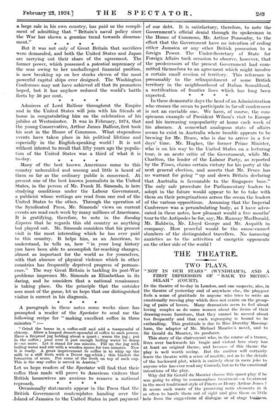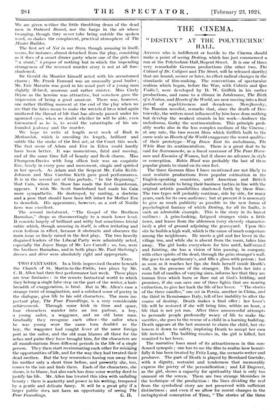THE THEATRE.
TWO PLAYS.
" NOT IN OUR STARS " (WYNDHAM'S), AND A FIRST IMPRESSION OF " BACK TO METHU- SELAH " (COURT).
Ix the theatre of to-day in London, and one suspects, also, in the theatre of yesterday and of anywhere else, the playgoer feels a sense of gratitude to anyone who tries to write an emotionally moving play which does not centre on the group- ing of pairs of lovers. Many dramatists seem to feel about loving couples as do some women about the items of their drawing-room furniture, that they cannot be moved about too frequently and that each regrouping is bound to be enthralling. This gratitude is due to Miss Dorothy Massing- ham, the adapter of Mr. Michael Maurice's novel, and to Sir Gerald du Maurier, its producer.
This story of the clairvoyant who, in the course of a trance, lives over backwards his tragic and violent love story has
at least an original theme, and because of this theme the
play is well worth seeing. But the auditor will certainly leave the theatre with a sense of muddle, not as to the details of the backward plot, which is entirely clear (a mere joke to anyone who has ever read any Conrad), but as to the emotional intentions of the play.
Why did Sir Gerald du Maurier choose this queer play if he was going to cling to commonplace treatment—a treatment in the most traditional style of Pinero or Henry Arthur Jones ? It seems such waste of the promising eerie elements in it so often to hustle them out of sight and give them so little help from the suggestions of dialogue or of stage business. We are given neither the little throbbing drum of the dead men in Outward Bound, nor the harps in the air whose twanging, though they never take being outside the spoken word, so shakes the complacent, practical atmosphere of The Master Builder.
The first act of Not in our Stars, though amusing in itself, seems, for instance, almost detached from the play, consisting as it does of a smart dinner party where one of the girls does " a stunt," apropos of nothing but in which the impending strangeness of the reversed murder story is not at all fore- shadowed.
Sir Gerald du Maurier himself acted with his accustomed charm ; Mr. Frank Esmond was an unusually good butler ; Mr. Eric Maturin was good in his usual part of a young man slightly ill-bred, amorous and rather sinister. Miss Cicely Bryne as the heroine was attractive, but somehow gave the impression of being a good amateur. There was, however, one rather thrilling moment at the end of the play when we see that the fates mean to make the wretched hero wind again unaltered the thread of life that has already passed under his agonized eyes, when we doubt whether he will be able, even forewarned as he is, to avoid the catastrophe of his un- founded jealousy and the murder.
We hope to write at length next week of Back to Methuselah, which is uncoiling its length, brilliant and subtle like the snake of the first act, at the Court this week. The first scene of Adam and Eve in Eden could hardly have been better. It was momentous, fatal and moving, and at the same time full of beauty and fresh charm. Miss Ffrangcon-Davies with long silken hair was an exquisite Eve, lovely in every pose and movement, simple and spirited in her speech. As Adam and the Serpent Mr. Colin Keith- Johnson and Miss Caroline Kieth gave good performances. It is in the second act of this prelude, " In the Beginning," that Cain, whom Mr. Shaw has made the first Guardsman, appears. I wish Mr. Scott Sunderland had made his Cain more sympathetic. He destroyed, by ranting, a doctrine and a pose that should have been left intact for Mother Eve to demolish. His appearance, however, as a sort of Nordic hero was excellent.
The second instalment, " The Gospel of the Brothers Barnabas," drops us disconcertingly to a much lower level. It consists largely of brilliant and witty but sometimes trivial satire which, though amusing in itself, is often irritating and even tedious in effect, because it obstructs and obscures the main issue so finely raised in the first play. The two heavily disguised leaders of the Liberal Party were admirably acted, especially the Joyce Burge of Mr. Leo Carroll ; so, too, were the brothers Barnabas, and in both plays Mr. Paul Shelving's dresses and decor were absolutely right and appropriate.
TARN.











































 Previous page
Previous page